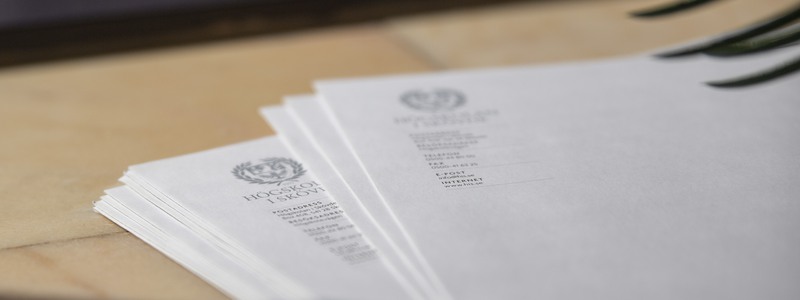Cheating and disciplinary measures

A basic rule for students at the University of Skövde is: don't cheat. Sometimes it can be difficult to know what the requirements are, especially as a new student. But what is considered to be cheating and what happens if you are suspected of cheating?
- Disciplinary offenses listed in The Higher Education Ordinance
- What happens if I am reported?
- Disciplinary measures
- Appealing a decision
- Who are in the disciplinary board?
- What happens with my examination?
- Assistance and support
The four disciplinary offenses listed in The Higher Education Ordinance
The Higher Education Ordinance lists four kinds of disciplinary offenses that may lead to your being reported to the Disciplinary Board. At the bottom of this page, you will find descriptions and examples of such acts.
What happens if I am reported?
Suspicion of cheating
If you are suspected of cheating or attempted cheating, you will be asked to come for a meeting. If you are suspected of cheating in a written examination, it is the examination coordinator who will meet you. It the suspicion concerns a thesis or other examining assignment, it is the head of the department at the school in question, the examiner, and sometimes also the course coordinator who will talk with you.
The purpose of the meeting is to inform you what you are suspected of doing and to give you an opportunity to, from your perspective, say what happened. If the suspicion remains after the meeting, a report is sent to the Vice-Chancellor. The report is handled by the administrative official of the Disciplinary Board.
When a report has been sent to the Vice-Chancellor, you will be informed about this. At that point, you have the opportunity to respond to the report by writing a remark. To write a remark is optional, but we recommend that you take this opportunity to describe your interpretation of the situation. Your remark is to be sent to registrator@his.se.
The decision by the Vice-Chancellor
The Vice-Chancellor thereafter decides if your case is to be handed over to the Disciplinary Board. The Vice-Chancellor can also by themself make a decision about your case and will then first consult with a member of the Disciplinary Board who has judicial-work experience. Such a person is, or has been, a judge in a court of law. A decision made by the Vice-Chancellor may lead to your case being dropped or that you receive a warning.
The Disciplinary Board
If your case is passed on to the Disciplinary Board, you will, via email, be summoned to a meeting with the day and time stated. It is important that you reply and say whether you will be attending or not. It is optional to attend the Disciplinary Board’s meeting. We recommend that you attend to present your interpretation of the situation and to give the committee an opportunity to ask you questions.
After the meeting, the decision of the Disciplinary Board will be sent to you via email, usually within five working days.
Disciplinary measures
The Disciplinary Board can decide to:
- Take no measures
This means that no measures will be taken and that you can continue your studies as usual.
- Give you a warning
A warning does not involve any limit to or restriction of your studies at the University, but it is a disciplinary measure that marks the reported action as going beyond what is permitted. If you were to be reported to the Disciplinary Board again, a warning may have an influence on the outcome.
- Suspend you
A suspension means that you are not allowed to take part in classes, examinations, group work, or other activities at the University during the time you are suspended. Furthermore, you are not allowed to be on the University premises. CSN will receive information about your suspension. A decision about suspension usually becomes valid on the first Monday after the committee meeting. It will be stated in the decision when your suspension begins. A suspension cannot last for a longer period of time than six months. During the time you are suspended, you still have the right to book meetings with a counselor, student counselor, and the student union. Your access to the University digital network and other systems will be blocked during the suspension.
A decision regarding disciplinary actions made by the Vice-Chancellor or the Disciplinary Board will not appear in your transcript of records, degree certificates, or in Ladok, but it will be recorded in the University register. The decision is an official document and anyone can therefore request to receive a University register copy.
Appealing a decision
You can appeal a decision about a warning or a suspension to an administrative court. You then need to clearly write which decision you want to appeal and what kind of change you request. You have to submit your appeal to the University registrar no later than three weeks from the day you received the decision. You will, at the same time as the decision is sent to you, also receive information about how an appeal is made.
Who are in the Disciplinary Board?
The Disciplinary Board is made up of the Vice-Chancellor or a Vice-Chancellor substitute (chairperson), a teacher representative, and two student representatives. One member has judicial-work experience and is, or has been, a judge in a court of law.
Besides the members of the committee and the student reported for cheating, the secretary of the committee and those who have prepared the case take part.
What happens with my examination?
The Disciplinary Board only tries the issue of whether you are guilty of unauthorized actions and cannot in any way make decisions or make any remarks on whether your study performance is to be assessed or not.
The examiner will not mark the assignment for which you are suspected of having cheated until you have received the Disciplinary Board’s decision. In cases where the Disciplinary Board decides to suspend you from your studies, the examination is normally regarded as invalid. However, it is the examiner in the course in question who finally decides whether an examination is to be regarded as invalid or if it is to be marked and graded.
Assistance and support
If you receive a decision about being suspended, we recommend that you contact and book a meeting with a student counselor. It is vital that there is a plan for your studies once you return after the suspension.
It can be lonely and difficult to be suspended. For that reason, it is important that you contact the University counselors and book a meeting.
Disciplinary offenses
Published: 2/20/2020
